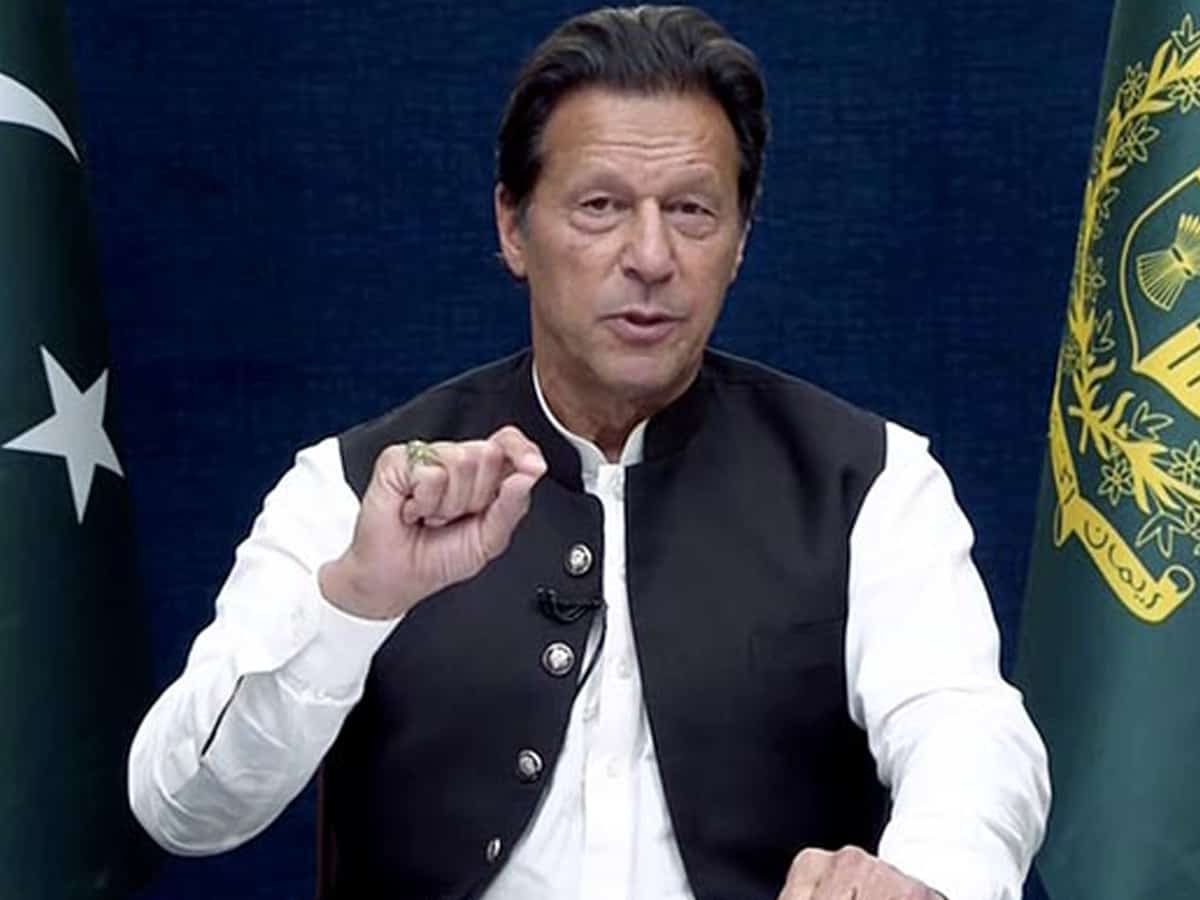
Islamabad: The Pakistani military should take a U-turn on its support to the “failed” government headed by Prime Minister Shehbaz Sharif, ousted premier Imran Khan has said, urging the powerful generals to review their decision as any wrong move by them would further widen the gulf between the people and the establishment.
Addressing a seminar organised by the Pakistan Federal Union of Journalists (PFUJ) here on Saturday, Khan, Chairman of the Pakistan Tehreek-e-Insaf (PTI) party said that the whole nation was looking toward the establishment as they have power.
Khan said it was important for leaders and generals to take U-turns’ as no one should consider himself infallible.
The longer the current setup runs, the more damaging it would be for the country, said Khan, who has been complaining about the powerful military abandoning him during the political crisis earlier this year.
Khan, who came to power in 2018, apparently lost the support of the Army after he refused to endorse the appointment of the ISI spy agency chief last year.
Finally, he agreed but it soured his ties with the military, which has ruled the coup-prone country for more than half of its 75 years of existence and has wielded considerable power in the matters of security and foreign policy.
Khan urged the establishment to take a U-turn on its support for the incumbent government led by Prime Minister Sharif. He said cash-strapped Pakistan stood at a critical juncture and it was very important that the right decisions were made today.
Khan said that backing a failed government would further widen the gulf between the people and the establishment.
He questioned whether the decision taken by the military establishment behind closed doors to support the incumbent regime was beneficial to Pakistan.
Who told them that the decision (to back Pakistan Muslim League-Nawaz led by Sharif) was a better option? Khan asked.
The nation is looking towards the establishment because they have the power, Khan said, adding that the current set-up would destabilise Pakistan politically and economically.
Khan also said that the country could not afford a weak army after witnessing the plight of those countries which failed to build a strong military.
At the same time, the 69-year-old cricketer-turned-politician, emphasised that the establishment should differentiate between constructive and damaging criticism.
He spoke about enforced disappearances and a clampdown on journalists under his regime and said that his government had nothing to do with whisking people away or restrictions on media.
I was never afraid of media [I] was the most criticised PM [yet] I never tried to bribe journalists or take action against them, the former prime minister claimed.
He said constructive criticism was necessary.
When we came to the government, we got to know that oftentimes people were picked up on [the pretext of] national security.
Khan said he spoke to Army chief Gen Qamar Javed Bajwa when Gen Faiz Hamid was the chief of the ISI, which resulted in the release of many forcibly disappeared people.
They [army] said the problem was regarding the judiciary, he said, adding that the explanation provided to him was that it was difficult to prosecute a terrorist in court due to a lack of evidence or witnesses.
Nonetheless, he said, an agreement was reached and his government was working on a bill that would have, at least, kept the families of the missing persons in the loop.
Khan also distanced his government from the abduction of journalists during the rule of the PTI government.
Shireen [Mazari] knows, it came up in Cabinet three or four times that some journalist was picked up; no journalist was picked up on my instructions, [as] the problem was something else, Khan added.
Disputing Khan’s stance that there were no restrictions on the press during his tenure, Information Minister Marriyum Aurangzeb said there are reports about restrictions placed on the press during the PTI era, adding that vile campaigns were launched on social media against journalists.
Imran Khan is saying that during my government the media was free, there was no restriction or censorship on the media, she said while showing various clippings regarding censorship during the government of the PTI. These included reports by Reporters Without Borders, Human Rights Watch, and the Council of Pakistan Newspaper Editors (CPNE).
She also mentioned cases of online harassment, kidnappings and threats faced by media persons, including women journalists and restrictions on electronic and print media during the previous government.
Separately, former president and Pakistan Peoples Party (PPP) leader Asif Zardari also reacted to Khan’s statements.
In a statement, he said that Imran Khan should have realised the importance of a free press while he was ruling the country and termed the PTI government the blackest phase for press freedom in the country’s history, according to the Dawn report.



